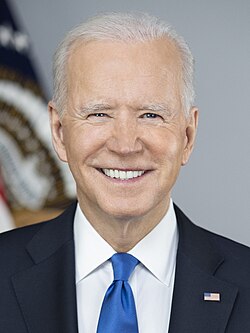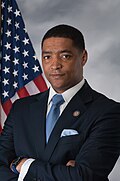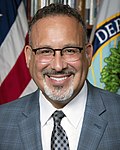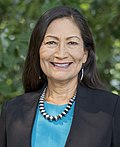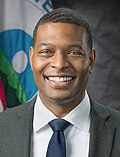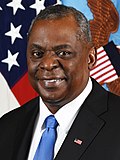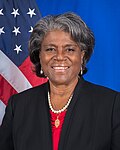 | |
President Donald Trump (left) and President-elect Joe Biden (right). | |
| Date of election | November 3, 2020 |
|---|---|
| Transition start | November 7, 2020 |
| Inauguration date | January 20, 2021 |
| President-elect | Joe Biden (Democrat) |
| Vice president-elect | Kamala Harris (Democrat) |
| Outgoing president | Donald Trump (Republican) |
| Outgoing vice president | Mike Pence (Republican) |
| Headquarters | 1401 Constitution Ave NW Washington, D.C., U.S. |
Co-chairs |
|
| Website | Build Back Better Archived 2021-01-20 at the Wayback Machine |
| ||
|---|---|---|
Personal U.S. Senator from Delaware 47th Vice President of the United States Vice presidential campaigns 46th President of the United States Tenure  | ||

The presidential transition of Joe Biden began on November 7, 2020, and ended on January 20, 2021. Unlike previous presidential transitions, which normally take place during the roughly 10-week period between the election in the first week of November and the inauguration on January 20, Biden's presidential transition was shortened somewhat because the General Services Administration under the outgoing first Trump administration did not recognize Biden as the "apparent winner" until November 23.
Contents
- Background issues
- Preparations for potential disputed election
- Delays in initiating the transition
- Timeline
- Pre-election
- Post-election
- Transition procedures
- Transition activities
- Establishment of the transition team
- Harris Senate transition
- Litigation
- COVID-19 Advisory Board
- Cabinet and White House appointments
- Department of Defense
- Planned executive orders and guidelines
- Transition team
- Co-chairs
- Advisory council
- Staff
- Financing
- References
- External links
Biden became the presumptive nominee of the Democratic Party for president in April 2020, and formally accepted the nomination the following August. Biden's transition team, led by Ted Kaufman, had already been announced on June 20. Further co-chairs joined the team alongside Kaufman in September. The 2020 presidential election took place on November 3. That evening, incumbent president Donald Trump declared himself the winner, based on his initial lead in tabulated in-person votes — a situation which was widely anticipated and quickly discredited as meaningless, since the votes counted at the time were not representative of the final total and it takes several days to count all the votes. Trump continued to falsely insist that he had won, alleging without evidence that Biden's increasing lead was due to widespread fraud, corruption, and other misconduct. He challenged the results in multiple lawsuits in multiple states, none of which resulted in a substantive victory. [1] [2] [3] [4] Because of Trump's denials, there was a several-week delay before his administration began even limited cooperation with the Biden team.
After three and a half days of vote counting, on November 7, at approximately 11:30 a.m. EST, the Associated Press, along with major TV networks including CNN, ABC News, CBS News, NBC News, and Fox News, called the race for Joe Biden. After that, most sources described him as the president-elect. Nonetheless, GSA administrator Emily Murphy, a Trump appointee, waited until November 23 to issue the "ascertainment" letter declaring Biden the "apparent winner" [5] [6] on the basis that Trump still disputed the election result. The declaration marked the official start of the transition, and withholding it from the Biden team had denied them $6.3 million, office space, government website status, and access to agencies. [7] [8] Separately, Biden was denied daily classified national security briefings [9] [10] [11] until the Trump administration approved Biden's receiving such briefings on November 24. [12]
The Electoral College met on December 14, 2020, to formally elect Biden and Kamala Harris respectively, as president and vice president. The results were to be certified by a joint session of Congress on January 6, 2021, but due to an attempt by Trump supporters to overturn the results by storming and vandalizing the Capitol building, the certification was not completed until January 7. [13] [14] [15] Biden's transition ended when he was inaugurated on January 20, 2021, at which point his presidency began.

